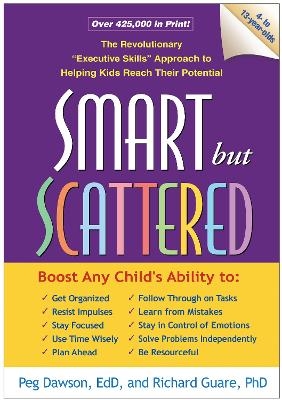
Smart but Scattered, First Edition
Guilford Publications (Verlag)
978-1-59385-445-4 (ISBN)
Peg Dawson, EdD, is a psychologist on the staff of the Center for Learning and Attention Disorders at Seacoast Mental Health Center in Portsmouth, New Hampshire. She also does professional development training on executive skills for schools and organizations nationally and internationally. Dr. Dawson is a past president of the New Hampshire Association of School Psychologists, the National Association of School Psychologists (NASP), and the International School Psychology Association, and a recipient of the Lifetime Achievement Award from NASP. She is coauthor of bestselling books for general readers, including Smart but Scattered, Smart but Scattered Teens, Smart but Scattered--and Stalled (with a focus on emerging adults), and The Smart but Scattered Guide to Success (with a focus on adults). Dr. Dawson is also coauthor of The Work-Smart Academic Planner, Revised Edition, and books for professionals including Executive Skills in Children and Adolescents, Third Edition. Richard Guare, PhD, is Director of the Center for Learning and Attention Disorders at Seacoast Mental Health Center in Portsmouth, New Hampshire. Dr. Guare's research and publications focus on the understanding and treatment of learning and attention difficulties. He is a neuropsychologist and board-certified behavior analyst who frequently consults to schools and agencies. He is coauthor of bestselling books for general readers, including Smart but Scattered, Smart but Scattered Teens, Smart but Scattered--and Stalled (with a focus on emerging adults), and The Smart but Scattered Guide to Success (with a focus on adults). Dr. Guare is also coauthor of The Work-Smart Academic Planner, Revised Edition, and books for professionals including Executive Skills in Children and Adolescents, Third Edition.
Introduction
I. What Makes Your Child Smart But Scattered
1. How Did Such a Smart Kid End Up So Scattered?
2. Identifying Your Child's Strengths and Weaknesses
3. How Your Own Executive Strengths and Weaknesses Matter
4. Matching the Child to the Task
II. Laying a Foundation That Can Help
5. Ten Principles for Improving Your Child's Executive Skills
6. Modifying the Environment: A Is for Antecedent
7. Teaching Executive Skills Directly: B Is for Behavior
8. Motivating Your Child to Learn and Use Executive Skills: C Is for Consequence
III. Putting It All Together
9. Advance Organizer
10. Ready-Made Plans for Teaching Your Child to Complete Daily Routines
11. Building Response Inhibition
12. Enhancing Working Memory
13. Improving Emotional Control
14. Strengthening Sustained Attention
15. Teaching Task Initiation
16. Promoting Planning and Prioritizing
17. Fostering Organization
18. Instilling Time Management
19. Encouraging Flexibility
20. Increasing Goal-Directed Persistence
21. Cultivating Metacognition
22. When What You Do Is Not Enough
23. Working with the School
24. What's Ahead?
| Erscheint lt. Verlag | 2.1.2009 |
|---|---|
| Verlagsort | New York |
| Sprache | englisch |
| Maße | 178 x 254 mm |
| Gewicht | 497 g |
| Themenwelt | Geisteswissenschaften ► Psychologie ► Pädagogische Psychologie |
| Sozialwissenschaften ► Pädagogik | |
| ISBN-10 | 1-59385-445-5 / 1593854455 |
| ISBN-13 | 978-1-59385-445-4 / 9781593854454 |
| Zustand | Neuware |
| Informationen gemäß Produktsicherheitsverordnung (GPSR) | |
| Haben Sie eine Frage zum Produkt? |
aus dem Bereich



